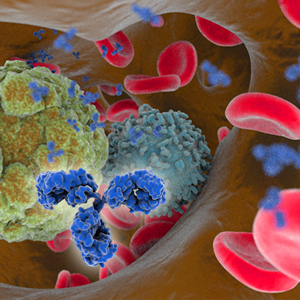 On July 17, 2023, the U.S. Food and Drug Administration (FDA) approved Beyfortus (nirsevimab-alip) for the prevention of respiratory syncytial virus (RSV) lower respiratory tract disease in neonates and infants born during or entering their first RSV season, and in children up to 24 months of age who remain vulnerable to severe RSV disease through their second RSV season. Beyfortus is a human IgG1ҡ antibody targeting RSV. Developed by AstraZeneca and Sanofi, the Fc domain was engineered using AstraZeneca’s proprietary YTE half-life extension technology. One dose of Beyfortus, administered as a single intramuscular injection prior to or during RSV season, may provide protection during the RSV season.
On July 17, 2023, the U.S. Food and Drug Administration (FDA) approved Beyfortus (nirsevimab-alip) for the prevention of respiratory syncytial virus (RSV) lower respiratory tract disease in neonates and infants born during or entering their first RSV season, and in children up to 24 months of age who remain vulnerable to severe RSV disease through their second RSV season. Beyfortus is a human IgG1ҡ antibody targeting RSV. Developed by AstraZeneca and Sanofi, the Fc domain was engineered using AstraZeneca’s proprietary YTE half-life extension technology. One dose of Beyfortus, administered as a single intramuscular injection prior to or during RSV season, may provide protection during the RSV season.
Beyfortus has been granted special designations to facilitate expedited development by several regulatory agencies. These include Breakthrough Therapy Designation and Priority Review designation by The China Center for Drug Evaluation under the National Medical Products Administration; Breakthrough Therapy Designation from the U.S. Food and Drug Administration; access granted to the European Medicines Agency (EMA) PRIority MEdicines (PRIME) scheme and EMA accelerated assessment; Promising Innovative Medicine designation by the UK Medicines and Healthcare products Regulatory Agency; and has been named “a medicine for prioritized development” under the Project for Drug Selection to Promote New Drug Development in Pediatrics by the Japan Agency for Medical Research and Development.
Beyfortus has been granted marketing authorization in the European Union, Great Britain and Canada for the prevention of RSV lower respiratory tract disease in newborns and infants from birth through their first RSV season and is currently undergoing regulatory review in China, Japan and several other countries. In Canada, nirsevimab is also approved for children up to 24 months of age who remain vulnerable to severe RSV disease through their second RSV season, and such indication is under review at the EMA level.
The safety and efficacy of Beyfortus were supported by three clinical trials (Trials 03, 04 and 05). The key measure of efficacy was the incidence of medically attended RSV lower respiratory tract infection (MA RSV LRTI), evaluated during the 150 days after Beyfortus administration. MA RSV LRTI included all health care provider visits (physician office, urgent care, emergency room visits and hospitalization) for lower respiratory tract disease with worsening clinical severity and a positive RSV test. Trials 03 and 04 were randomized, double-blind, placebo-controlled, multicenter clinical trials.
Trial 03 (Phase 2b study, NCT02878330) included 1,453 preterm infants (born at greater than or equal to 29 weeks of gestational age up to less than 35 weeks of gestation) who were born during or entering their first RSV season. Of the 1,453 preterm infants in the trial, 969 received a single dose of Beyfortus and 484 received placebo. Among infants who were treated with Beyfortus, 25 (2.6%) experienced MA RSV LRTI compared with 46 (9.5%) infants who received placebo. Beyfortus reduced the risk of MA RSV LRTI by approximately 70% relative to placebo. The Beyfortus dosing regimen was determined based on further exploration of the Phase 2b data and was used in subsequent trials as a single 50 mg dose for those who weigh less than 5 kg, or a single 100 mg dose for those who weigh 5 kg or greater
For Trial 04 (Phase 3 MELODY study, NCT03979313), the primary analysis group within the trial included 1,490 term and late preterm infants (born at greater than or equal to 35 weeks in gestational age), 994 of whom received a single dose of Beyfortus and 496 of whom received placebo. The primary endpoint was met, reducing the incidence of medically attended RSV LRTD by 74.9% (95% CI 50.6, 87.3; P<0.001) compared to placebo. Among infants who were treated with Beyfortus, 12 (1.2%) experienced MA RSV LRTI compared with 25 (5.0%) infants who received placebo.
Trial 05 (Phase 2/3 MEDLEY study, NCT03959488), a randomized, double-blind, active (palivizumab)-controlled, multicenter trial, supported the use of Beyfortus in children up to 24 months of age who remain vulnerable to severe RSV disease through their second RSV season. The trial enrolled 925 preterm infants and infants with chronic lung disease of prematurity or congenital heart disease. The safety and pharmacokinetic data from Trial 05 provided evidence for the use of Beyfortus to prevent MA RSV LRTI in this population.
References
Trial 03: Griffin MP, et al. Single-dose nirsevimab for prevention of RSV in preterm infants. N Engl J Med. 2020;383(5):415-425. doi: 10.1056/NEJMoa1913556.
Trial 04: Hammitt LL, et al. Nirsevimab for prevention of RSV in healthy late-preterm and term infants. N Engl J Med. 2022;386(9):837-846. doi:10.1056/NEJMoa2110275.
Trial 05: Domachowske J, et al. Safety of nirsevimab for RSV in infants with heart or lung disease or prematurity. N Engl J Med. 2022;386(9):892-894. doi:10.1056/NEJMc2112186.


